Dark City (1998)
“A Parallel Reality Masterpiece”
“Dark City” is a mesmerizing exploration of a parallel reality, much like the world within The Matrix. The film’s atmospheric noir setting and mind-bending plot resonate with our own experience of being trapped in an illusionary world. Its seamless blend of sci-fi, mystery, and psychological elements showcases a compelling narrative that captivates and challenges the audience’s perception of reality.
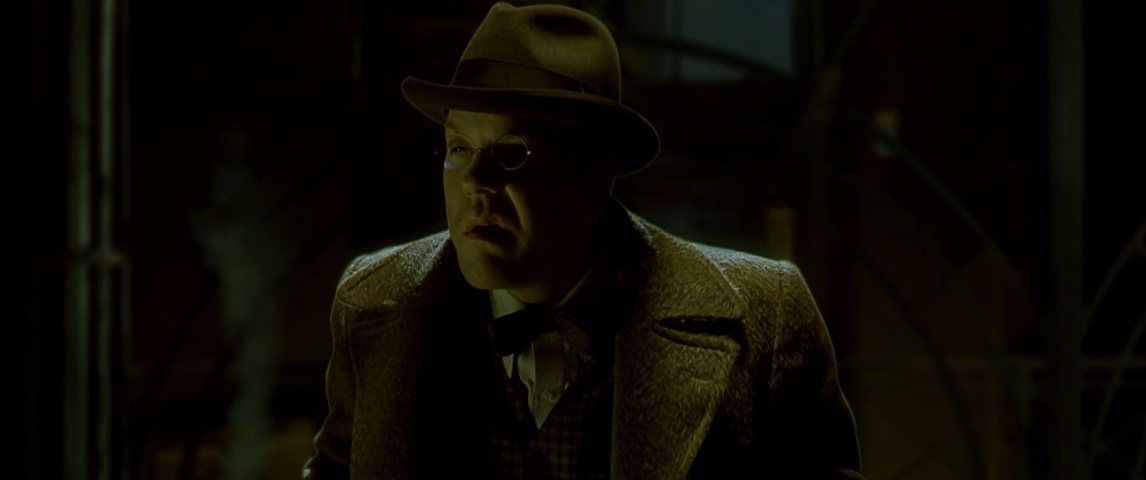
The film’s central theme of identity and memory manipulation strikes a chord with the struggles faced by those jacked into the Matrix. The dark and moody visuals reminiscent of the Matrix’s simulated reality add an eerie and immersive quality to the movie. As we journey with John Murdoch through a reality that constantly reshapes itself, we can’t help but draw parallels to Neo’s own quest for truth.
Rufus Sewell’s powerful performance as John Murdoch brings depth and complexity to the character, making us reflect on the nature of free will and self-awareness – themes also central to The Matrix. While not as action-packed as the latter, “Dark City” compensates with its intellectual depth and philosophical underpinnings.
In conclusion, “Dark City” serves as an excellent companion piece to The Matrix, exploring similar philosophical concepts while presenting them in a different, yet equally gripping, narrative. If you enjoyed pondering the nature of reality in The Matrix, “Dark City” will undoubtedly leave you pondering long after the credits roll.
eXistenZ (1999)
“A Trippy Dive into Virtual Realms”
“eXistenZ” is a mind-bending rollercoaster ride that delves into the concept of virtual realities, much like the simulations within The Matrix. The film’s metafictional narrative and intricate plotline intrigue and keep us on our toes, mirroring the experience of discovering the truth about the Matrix.
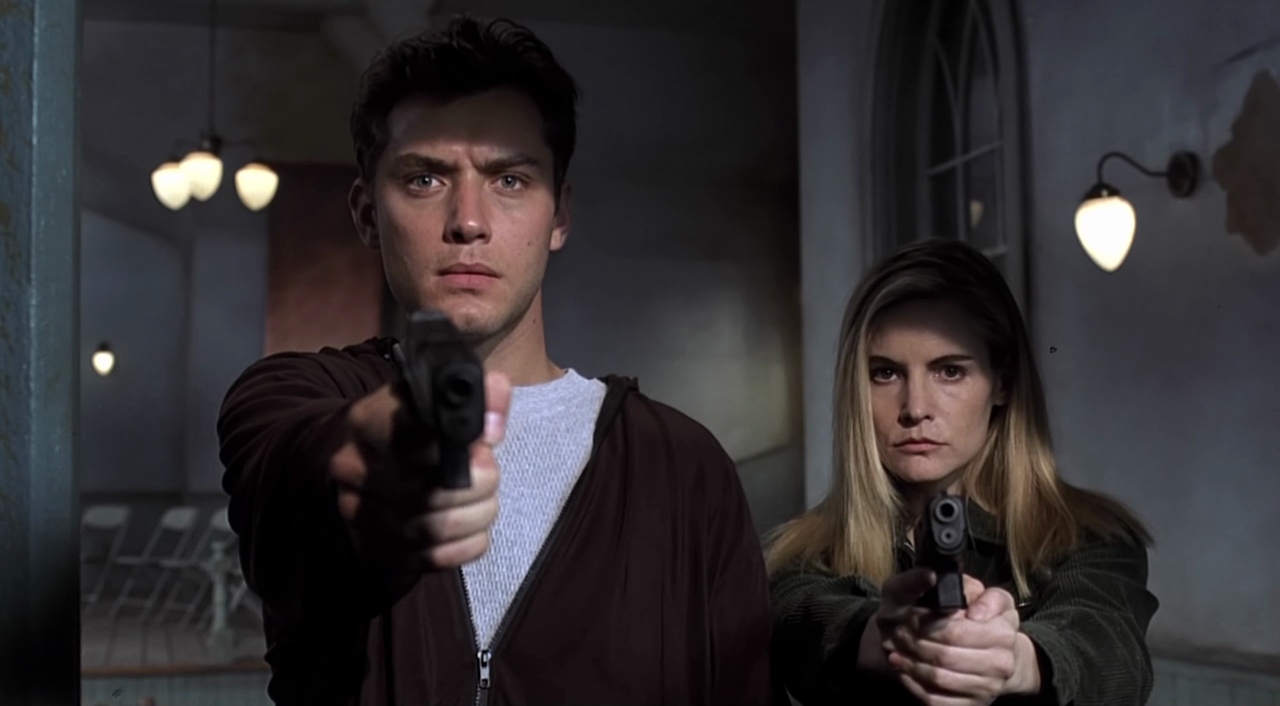
As Allegra Geller (played by Jennifer Jason Leigh) and Ted Pikul (played by Jude Law) navigate through layers of virtual worlds within the game “eXistenZ,” we can’t help but be reminded of Neo’s journey as he awakens from the simulated reality of the Matrix. The blending of the real and virtual becomes increasingly blurred, challenging the characters and the audience to question what is genuine and what is an illusion.
The grotesque and surreal visuals within the virtual realms evoke a sense of uncanniness and discomfort, much like the simulated world in The Matrix. The film’s focus on the human connection and the desire to break free from oppressive constructs resonates with the underlying themes of freedom and rebellion in The Matrix.
David Cronenberg’s distinct directorial style adds an additional layer of complexity and intrigue to “eXistenZ.” While it may not have the same level of high-octane action as The Matrix, it compensates with its thought-provoking themes and psychological depth.
“eXistenZ” offers a thrilling and thought-provoking dive into the realms of virtual reality, complementing The Matrix’s exploration of simulated worlds and the human desire for liberation from the artificial constructs.
The Thirteenth Floor (1999)
“When Reality and Illusion Collide”
“The Thirteenth Floor” is a fascinating journey into the intertwining realms of reality and illusion, mirroring The Matrix’s exploration of simulated worlds. The film’s compelling narrative and thought-provoking premise immediately draw parallels with our own existence as we ponder the nature of our reality.
As we follow Douglas Hall and his quest to uncover the truth behind the simulated world of 1937 Los Angeles, we can’t help but be reminded of Neo’s quest for the truth about the Matrix. The film raises thought-provoking questions about identity, consciousness, and the nature of existence, much like The Matrix’s philosophical inquiries.
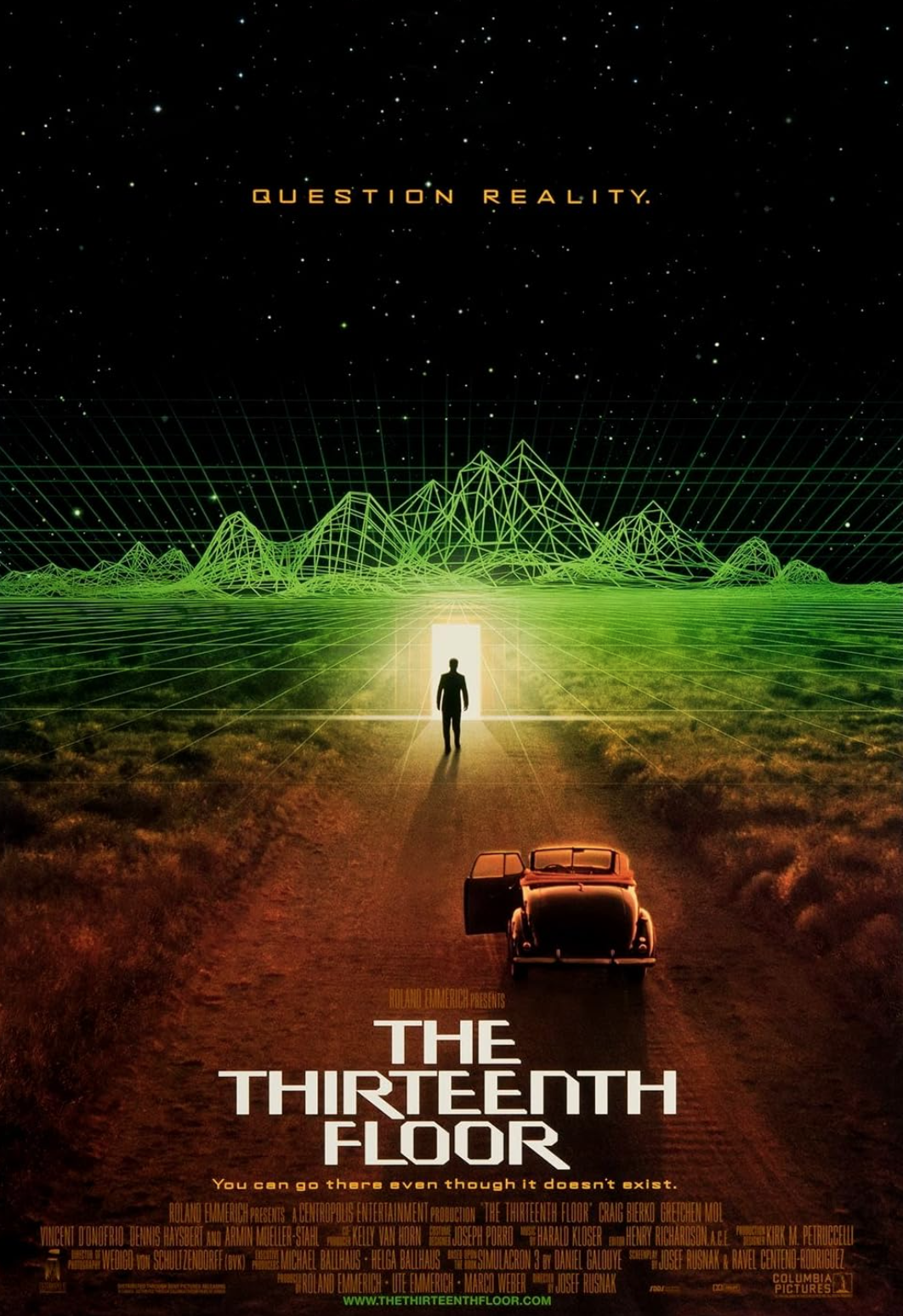
The seamless transitions between the two simulated worlds create an immersive experience that challenges our perceptions of reality, much like The Matrix’s simulated constructs. The film’s clever plot twists and engaging storytelling keep us on the edge of our seats, akin to the suspenseful moments in The Matrix.
While “The Thirteenth Floor” may not match The Matrix’s action-packed sequences, it compensates with its focus on the human psyche and the search for ultimate truth. Craig Bierko’s portrayal of Douglas Hall adds depth and emotion to the character, making us empathize with his quest for answers.
In conclusion, “The Thirteenth Floor” presents a captivating exploration of reality, identity, and the blurred lines between the authentic and the artificial. Fans of The Matrix’s mind-bending themes and existential questions will find much to appreciate in this thought-provoking film.
Twelve Monkeys (1995)
“A Time-Twisting Tale of Fate and Reality”
“Twelve Monkeys” offers a thrilling time-travel narrative that draws parallels with The Matrix’s bending of reality and the manipulation of time. As we follow James Cole on his mission to prevent a deadly virus outbreak, we are reminded of Neo’s own quest to alter the fate of humanity.
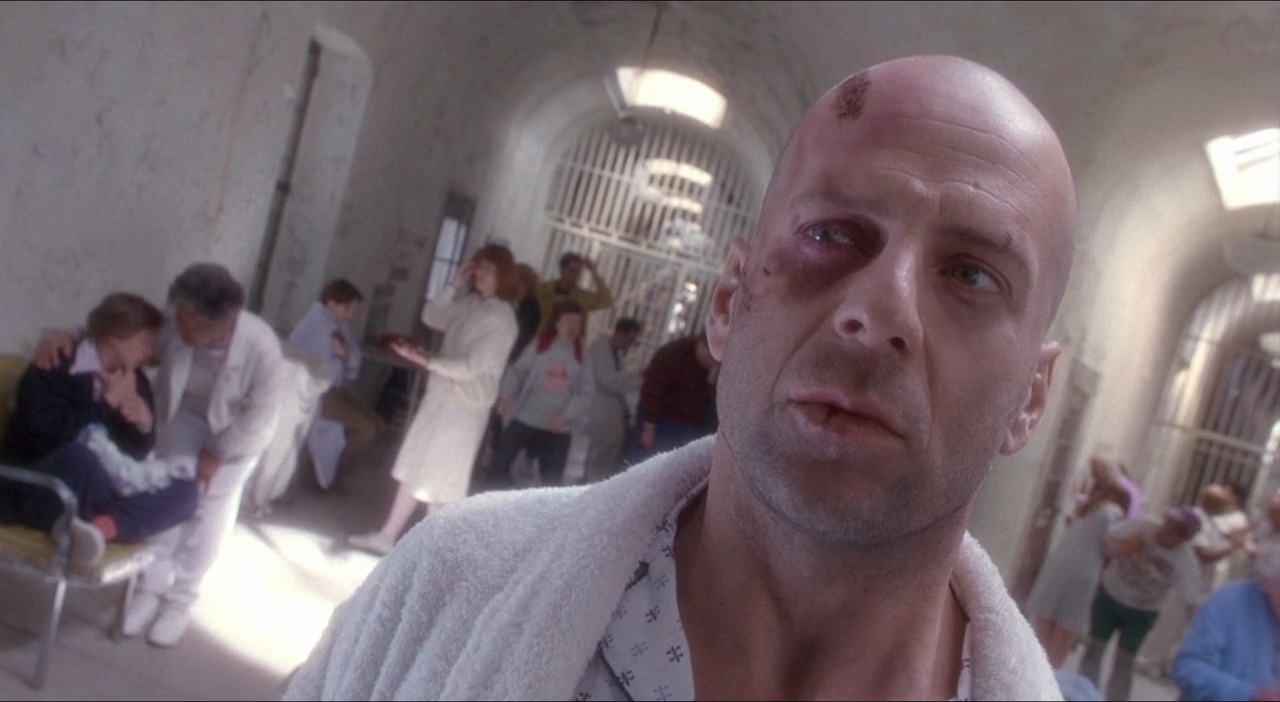
The film’s exploration of time loops and paradoxes echoes The Matrix’s complex narrative structure. Both stories challenge our understanding of causality and fate, inviting us to question the concept of free will within the constraints of predetermined events.
Bruce Willis delivers a compelling performance as James Cole, bringing a sense of urgency and determination to his character, similar to Keanu Reeves’ portrayal of Neo. The film’s gritty and dystopian visuals complement the dark atmosphere of The Matrix, further emphasizing the themes of a crumbling world and the struggle for survival.
“Twelve Monkeys” may not have the same cyberpunk aesthetic as The Matrix, but it compensates with its intelligent and gripping storytelling. The film’s exploration of human nature and the consequences of our actions resonates with The Matrix’s underlying messages about humanity and the fight for a better future.
In summary, “Twelve Monkeys” is a thought-provoking and suspenseful journey through time, complementing The Matrix’s exploration of reality, fate, and the human spirit. If you’re a fan of time-travel narratives and mind-bending concepts, this film is a must-watch.
Johnny Mnemonic
“A Cyberpunk Adventure into Information Overload”
“Johnny Mnemonic” takes us on a cyberpunk adventure that bears resemblances to The Matrix’s exploration of technology’s impact on the human mind and society. The film’s futuristic setting and the concept of information storage within the human brain mirror The Matrix’s themes of artificial intelligence and the virtual world.
As Johnny Mnemonic, portrayed by Keanu Reeves, navigates through a world controlled by powerful corporations and advanced technology, we can’t help but draw parallels to Neo’s journey in The Matrix, where he battles against the machines that have enslaved humanity.
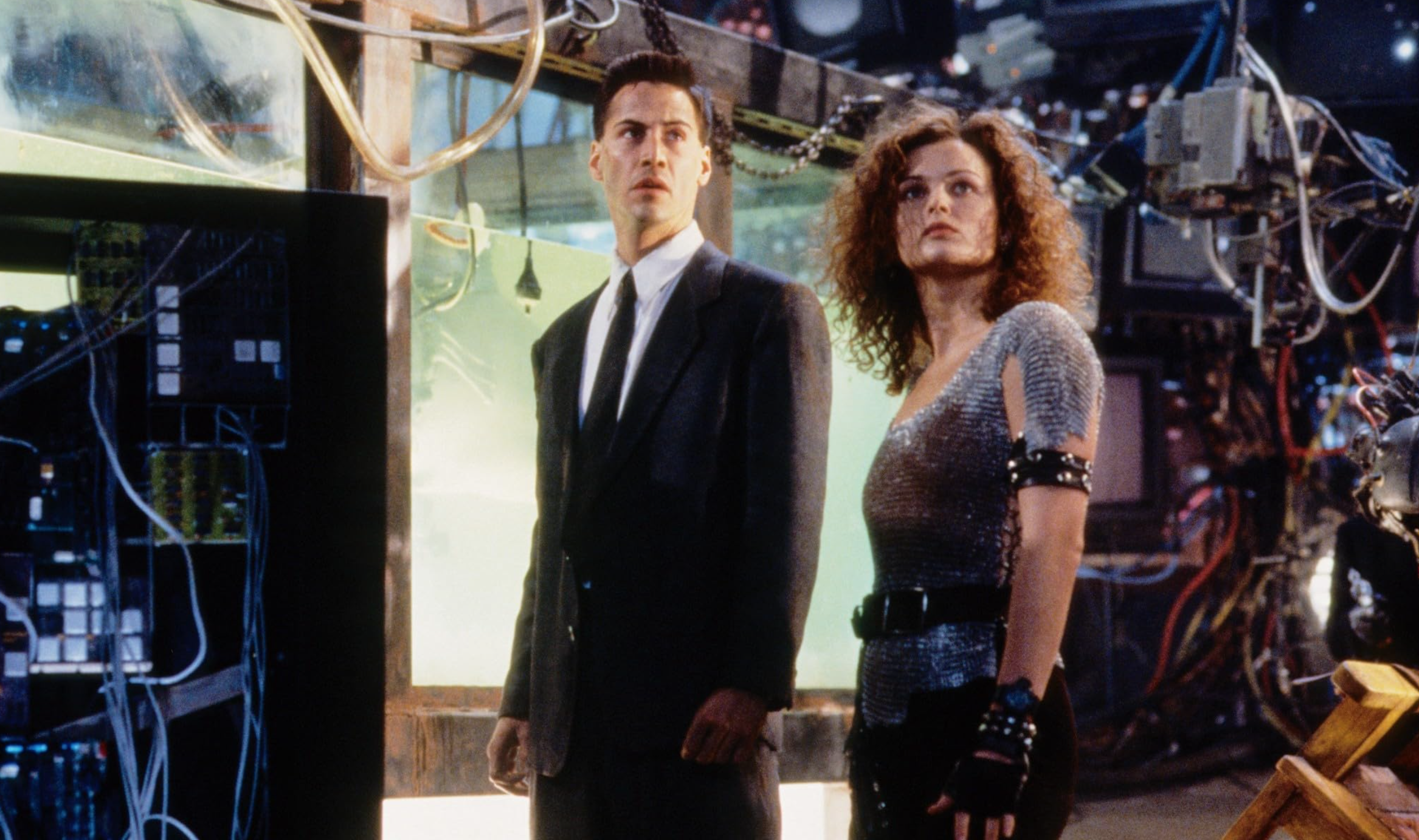
The film’s depiction of a dystopian society where knowledge and information are the most valuable commodities highlights the dangers of unchecked technological advancements – a theme that resonates with The Matrix’s portrayal of a world dominated by artificial intelligence.
While “Johnny Mnemonic” may not have the same level of philosophical depth as The Matrix, it delivers on its cyberpunk aesthetics and action-packed sequences. Keanu Reeves’ performance adds a sense of familiarity for fans of The Matrix, and the film’s exploration of transhumanism and corporate greed provides food for thought.
In conclusion, “Johnny Mnemonic” is an entertaining cyberpunk adventure that complements The Matrix’s exploration of technology’s influence on society and the human mind. If you enjoy action-driven narratives set in dystopian futures, this film is worth a watch.



